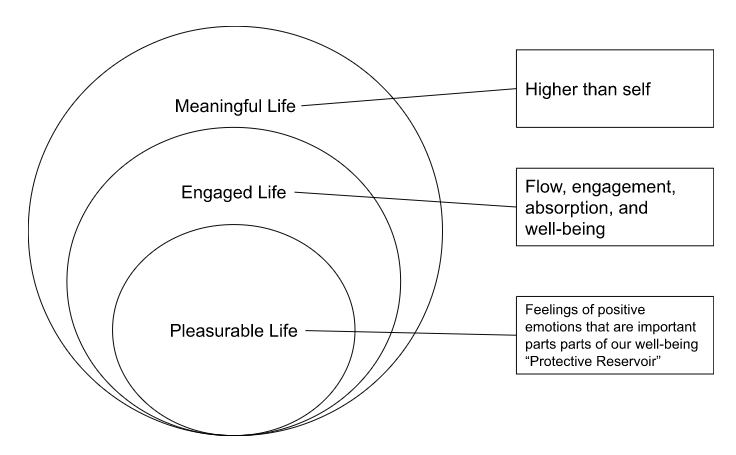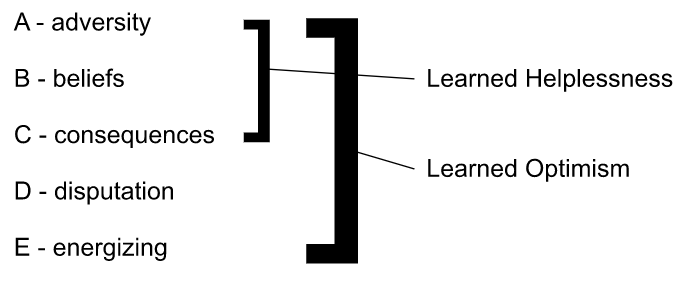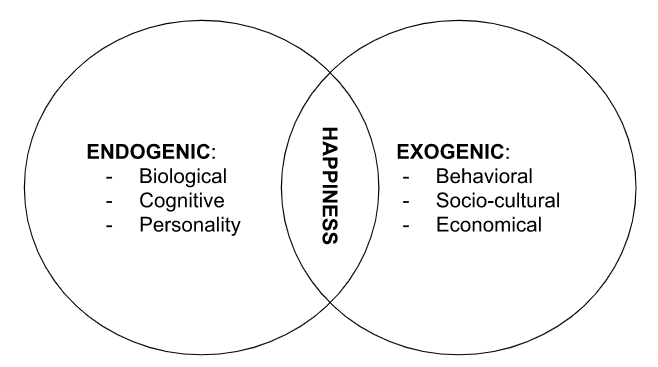
Positive Psychology: Authentic Happiness
Learned Helplessness
a state that occurs after a person has experienced a stressful situation repeatedly
They come to believe that they are unable to control/change the situation, so they do not try -- even when opportunities for change become available
Learned Optimism
a concept that says we can change our attitude and behaviors -- by recognizing and challenging our negative self-talk, among other things
Benefits
improved health
motivation and performance
career success
Authentic Happiness


Pleasant Life
Amplifying positive emotion and acquiring the skills to do this
“What makes you happy?”
Engaged Life
Where you discover your highest strengths and reshape your life to make the most of them -- in relationships, leisure, work
“What engages you?”
Meaningful Life
Utilizes them to “belong to and serve something you believe is larger than the self”
“What gives your life meaning?”
PERMA Model
P = Positive Emotion
feeling good, positive emotions, optimism, pleasure, enjoyment
E = Engagement
fulfilling work, interesting hobbies, “flow”
R = Relationships
social connections, love, intimacy, emotional, and physical interaction
M = Meaning
having a purpose, finding a meaning in life
A = Accomplishment
ambition, realistic goals, important achievements, pride in yourself
Flourishing
State of positive mental health
To thrive, prosper, and to fare well in endeavors:
Free from mental illness
Filled with emotional vitality
Function positively in private and social realms
Often correlated with:
academic achievement
mastery goal-setting
higher levels of self-control
continued perseverance
Languishing
A state where positive emotions appear too low to stimulate flourishing and emotional distress, social impairment or lack of fulfillment are present
Individuals who do not have mental illness but who are low in social, emotional, and psychological well-being

Positive Psychology: Authentic Happiness
Learned Helplessness
a state that occurs after a person has experienced a stressful situation repeatedly
They come to believe that they are unable to control/change the situation, so they do not try -- even when opportunities for change become available
Learned Optimism
a concept that says we can change our attitude and behaviors -- by recognizing and challenging our negative self-talk, among other things
Benefits
improved health
motivation and performance
career success
Authentic Happiness


Pleasant Life
Amplifying positive emotion and acquiring the skills to do this
“What makes you happy?”
Engaged Life
Where you discover your highest strengths and reshape your life to make the most of them -- in relationships, leisure, work
“What engages you?”
Meaningful Life
Utilizes them to “belong to and serve something you believe is larger than the self”
“What gives your life meaning?”
PERMA Model
P = Positive Emotion
feeling good, positive emotions, optimism, pleasure, enjoyment
E = Engagement
fulfilling work, interesting hobbies, “flow”
R = Relationships
social connections, love, intimacy, emotional, and physical interaction
M = Meaning
having a purpose, finding a meaning in life
A = Accomplishment
ambition, realistic goals, important achievements, pride in yourself
Flourishing
State of positive mental health
To thrive, prosper, and to fare well in endeavors:
Free from mental illness
Filled with emotional vitality
Function positively in private and social realms
Often correlated with:
academic achievement
mastery goal-setting
higher levels of self-control
continued perseverance
Languishing
A state where positive emotions appear too low to stimulate flourishing and emotional distress, social impairment or lack of fulfillment are present
Individuals who do not have mental illness but who are low in social, emotional, and psychological well-being

 Knowt
Knowt
